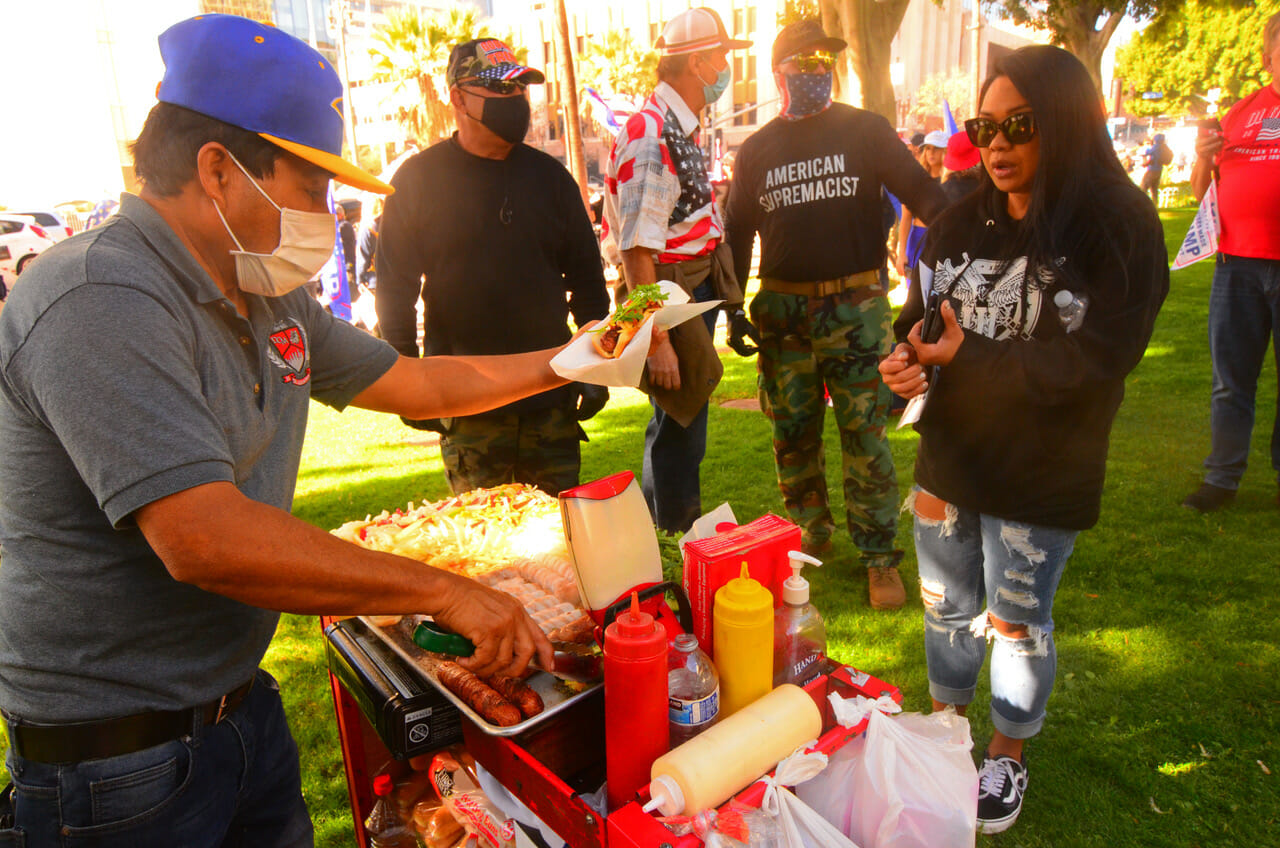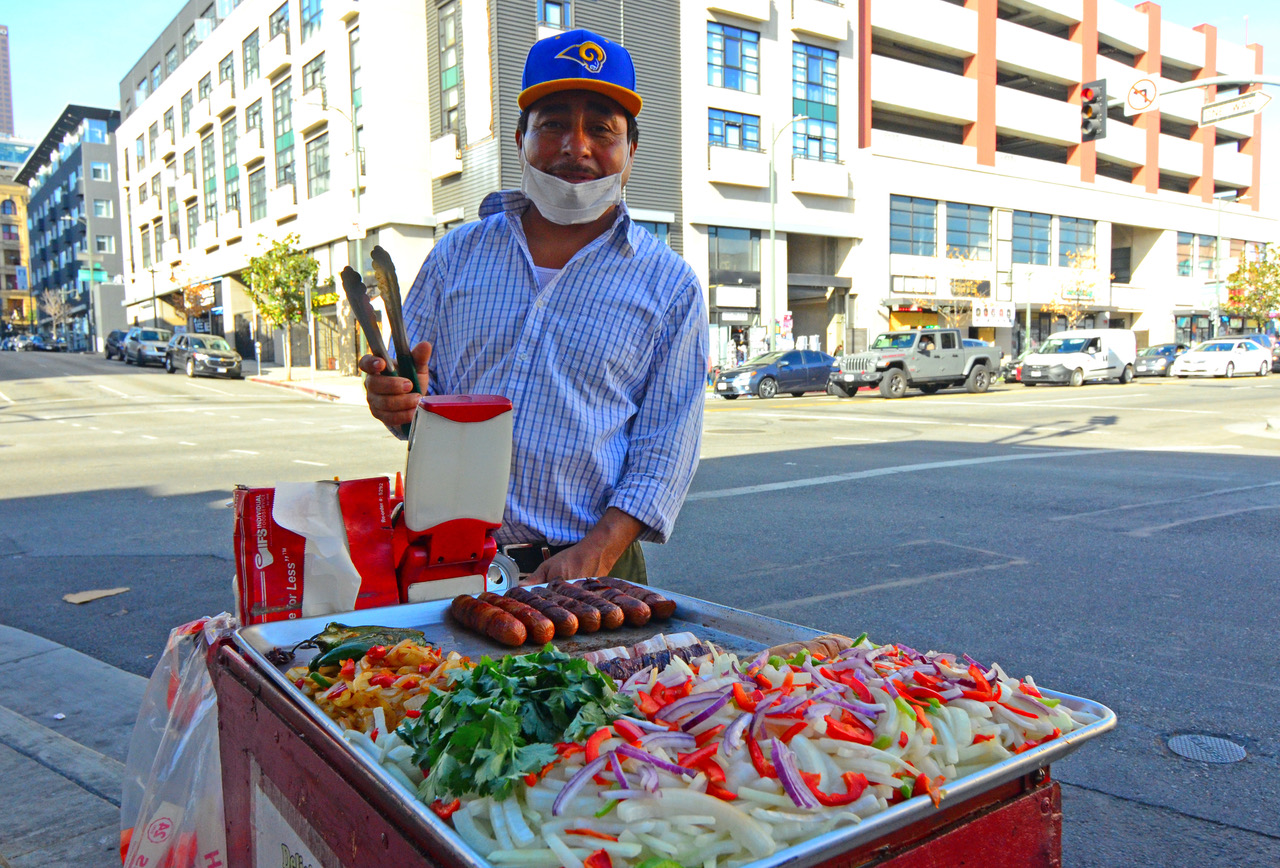As an independent news outlet, we enjoy the privilege of covering issues that bigger outlets won’t. At Los Angeleno, we write about people, places and idiosyncrasies with local impact and beyond. Your support is vital for us to continue doing so.
With your help, we can continue to write the first draft of history in Los Angeles. Check out our membership options and join today!
While supporters of President Donald Trump sieged the U.S. Capitol last Wednesday, about 200 mostly unmasked demonstrators gathered outside Los Angeles City Hall, brandishing American flags and signs bearing messages like “Stop the Steal” and “Make America Great Again.”
Outraged over the 2020 presidential election results, what had started as a peaceful rally quickly devolved into a violent and chaotic scene that saw two photographers physically assaulted and at least two counterprotesters peppered-sprayed and beaten.
Yet, in the midst of it all, Don Efrain Gonzalez, a lone 53-year-old street food vendor from South L.A., grilled away while trying to earn his keep hawking what some consider to be one of L.A.’s most iconic street food — the Danger Dog.
His only concern: to provide el pan del día for his family.
“I left it in God’s hands,” he says in Spanish. “I didn’t go there thinking I was going to get sick or hurt. I didn’t think about the fighting. I was there to work and make money for my family. Con ese fin andaba yo — That was the only goal I had in mind.”
Unbeknownst to Gonzalez, a video clip of him taken from a Fox 11 News segment had gone viral on social media. Nelson Montoya first uploaded the clip to Twitter; it showed a masked street vendor in a Rams hat grilling hot dogs in the middle of a crowd of Trump supporters.
Aside from receiving comments like, “Amigo, what are you doing here? You should be over there,” from some individuals among the throng of Trump supporters, Gonzalez says he didn’t feel he was in danger. Mostly, he worried about being fined or arrested when tensions began to rise.
“I’m just glad nobody was messing with him and that he was able to make his money,” Montoya said over the phone. “It’s hard for Latinos to make profits. Especially with those guys.”
“Criticisms don’t bother me anymore,” Gonzalez says. “I’ve been at this so long I guess you could say I’ve grown used to it. What’s worse is when police officers fine us. That really hurts. The insults one learns to ignore but the ticket fines, those hurt.”
As fighting erupted between the president’s supporters and his critics, police officers stepped in to arrest six people involved in a brawl that had spilled over onto Spring Street, outside LAPD headquarters. That’s when Gonzalez decided it was time to leave.
He could hear the echoing fracas and tear gas being fired behind him as he rolled his squeaky little red cart back to his regular Central City East location, carrying the few bucks he was able to make stashed in his front pocket.
Last week’s rally wasn’t Gonzalez’s first rodeo, however. Having worked as a street food vendor for more than 25 years, he’s attended multiple protests and other large gatherings before, including Black Lives Matter demonstrations and the Biden-Harris electoral win celebration in November.
“It’s not so much what the substance of an event is,” says Jesus Gonzalez Saucedo, Gonzalez’s 22-year-old son. “Before the pandemic, we would travel to locations as far as Las Vegas and San Francisco — Colorado even — for soccer games.”
Saucedo says his father was “just doing what he always does, which is making a living.” But when the video went viral, family members and friends called to voice their concerns over his father’s safety.
“I didn’t even consider that at first because, ‘He’s just selling hot dogs,’ I thought. I’d forgotten that it was a freaking Trump rally,” Saucedo says.

Before the pandemic, Gonzalez and other family members — like his mother who first taught him the ins and outs of street vending when he was 12 years old — would park their carts near locations where they knew large crowds would gather.
The L.A. Convention Center, Staples Center, Dodgers Stadium, high schools and elementary schools were the usual hot spots.
“If there was an event here or a march there, I’d show up,” Gonzalez says. “A concert at the Staples Center or a Lakers game, I’d show up. Any event, I’d show up. Suddenly, they were all canceled.”
Last January, street vendors finally won a decade’s long battle to make vending legal in Los Angeles. But a knotty city and county permitting process had a lot of street vendors opting out instead.
Then the coronavirus arrived in Los Angeles, and the precarious situation street vendors had been operating under suddenly got worse.
“It was a disaster,” Gonzalez says. “Not just for me, obviously, but for all of us, economically, because I always depended on things like rallies or marches to pay the bills, food, housing — everything.”
Necessity forced the family to travel across the state more frequently, risking their lives and putting their health at risk.
About five years ago, according to Saucedo, two Pico-Union residents died after their truck flipped over while driving back to Los Angeles from San Francisco. “We knew them growing up,” he says. “They sold alongside us. That happened to them just to go make a living. To go sell hot dogs.”
Then last summer, Gonzalez was nearly robbed when three men demanded he hand over his money while he was selling raspados, but he managed to foil their plans with the help of a good samaritan that happened to be driving by as they had him surrounded.
“So that’s the context under how street vendors have had to operate, how my dad has had to reconfigure how he was going to make his living,” Saucedo says. “It’s easy to romanticize poverty, the struggle, the hustle. But if you just dig deeper, you might find there’s a lot of layers.”
Thinking back on last Wednesday, Gonzalez chuckles as he tries to describe having been caught on news cameras.
“I’m too timid about things like that,” he says. “In the clip, if you notice, I was moving around. I was trying to outmaneuver them. But that day, they got me. Pero pues aquí estamos.”
His family has created a GoFundMe page for anyone interested in helping out.

